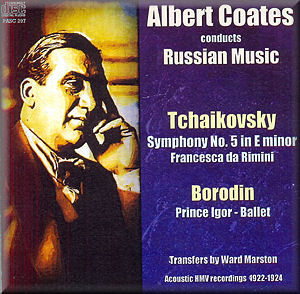 |
 |
|


alternatively
CD & Download: Pristine
Classical
|
Piotr Ilyich TCHAIKOVSKY (1840-1893)
Symphony no. 5 in E minor op.64 [41:17]
Francesca da Rimini op.32 [18:51]
Alexander BORODIN (1833-1887)
Prince Igor: Polovtsian Dances [8:42]
 Symphony Orchestra/Albert Coates
Symphony Orchestra/Albert Coates
rec. 25 October, 3, 17 November, 22 December 1922 (Symphony), 22,
24 October 1924 (Francesca), 18 October 1923 (Borodin)
Transfers by Ward Marston
 PRISTINE AUDIO PASC 297 [68:50]
PRISTINE AUDIO PASC 297 [68:50] 
|
|
|
This review follows on from that of a companion disc containing
Coates’s recordings from the 1920s of shorter Russian and French
pieces. For a rounded picture, readers should start with that
review.
Although these recordings were made at the same time as the others, and have been transferred by the same engineer, Ward Marston, presumably using the same method, I find them less satisfactory to listen to. I think this is because Tchaikovsky’s music is essentially string-based, whereas the pieces on the other disc rely much more on wind and brass colours. It is evident here, as it wasn’t on the companion CD, that the acoustic recording process allowed Coates a wretchedly small complement of strings. Also very evident here is the typical device used in acoustic recordings of substituting pizzicato strings – which didn’t register properly – with a tuba, to be heard squelching its way grotesquely through the tender Francesca love music. Also, Francesca in particular contains a lot of loud music and it comes across so confused that one wonders what a listener living far away from any city offering regular orchestral concerts would have thought of this music, which is made to sound far more modern than the Stravinsky on the companion disc.
Given that real enjoyment is unlikely, the question remains whether Coates’s interpretations offer such insights as to make it worth our while to persevere nonetheless. I have to say they don’t seem to. After a perfunctory introduction he launches the symphony’s main Allegro incredibly slowly, then soon he is tearing away in a manner that suggests hysteria rather than passion. The lyrical second subject is pulled about in a very exaggerated manner. Perhaps this would have a sense if we could hear it better. As to whether I could ever enjoy an Andante cantabile launched so fast, and frequently getting faster still, I have my doubts. Side-lengths sometimes dictated strange tempi in those days, but Coates’s version of the symphony spread over 6 discs, as did the 1928 version by Sir Landon Ronald, who offered a spacious, noble reading of this movement. The years between 1922 and 1928 saw the introduction of electrical recording, to the obvious advantage of the Ronald version. All the same, if this latter offers a brooding, powerful and passionate interpretation that can still be fully enjoyed I don’t think the difference is to be attributed only to the recording.
Connoisseurs of orchestral traditions will be surprised to hear the horn in the second movement using a euphonium-like vibrato. This has never been a feature of British orchestral playing, though it is habitual in military bands and British orchestral players can provide it if asked. Listen to the opening of Sullivan’s In Memoriam as played by the City of Birmingham Orchestra under the noted brass band conductor Sir Vivian Dunn! So presumably Coates wanted this. By contrast, the player in the Ronald recording has a very pure tone, beautifully controlled, and launches the movement memorably.
Coates’s 1930 recording of Francesca da Rimini was included in the “Great Conductors of the Century” set dedicated to him. It is sufficiently well recorded to show that Coates’s interpretation was electric in the depiction of the inferno, passionate if not especially imaginative in the love music. Since he presumably made the new recording as a replacement for the old, he would be surprised to know people were listening to the 1924 version in 2011.
The Borodin is something that has to be heard to be believed. The documentation gives nothing away so I feel a bit guilty about making a spoiler and telling you that, first of all, Coates doesn’t indulge the famous tune as conductors have tended to do ever since “Kismet”, he has it bouncing merrily along. And then, unannounced, there’s a choir, or at least a small group of voices – individual vibratos can be heard. Now, conductors can usually get an orchestra to play in the style they want, but choirs tend to arrive ready-trained and the conductor just hasn’t the time to train them all over again in a different style let alone teach them a different vocal technique. This choir has it in its genes that it’s here to sing Nymphs and Shepherds, and then Gilbert and Sullivan, and there’s precious little Coates can do about it. He does get up lashes of energy in the later dances, but here we have the strange effect created by the dominance of the big drum pounding away its steady, remorseless beat. In place of Borodin’s barbaric splendour we have something closer to African primitivism.
I see I was highly impressed by the “Great Conductors” compilation. I haven’t heard it again since, apart from Francesca. What worries me is the fact that I remember nothing at all about what I heard. Even rereading my review rings no bells. Is it possible that Coates was a great disciplinarian and energizer but too superficial an interpreter for his performances to stay in the mind? Unfortunately, these old acoustic recordings seem to emphasize the weaker sides of his art. For confirmed admirers only, I’d say.
Christopher Howell
|
|












